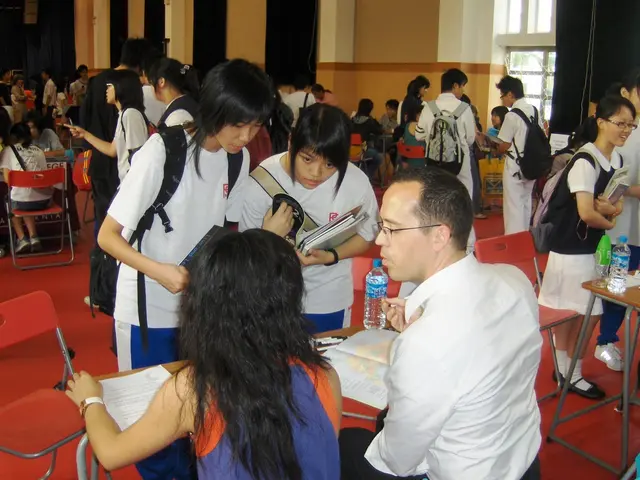Whispered Liaisons in Baku: SPD and CDU Politicians Meet with Putin Allies' Shadowy Counterparts
SPD and CDU politicians hold talks with Putin's associates
Want the scoop on a juicy political scandal? Buckle up, because we're diving headfirst into the revelation of secret talks between SPD and CDU politicians and Putin allies, set in the exotic locale of Baku, Azerbaijan.
In the midst of April, some of Germany's most influential politicos and lobbyists ventured to Baku, as per a report by ARD's Kontraste and Die Zeit. This high-profile group was in Azerbaijan from April 13 to 14.
The illustrious assembly included SPD MP Ralf Stegner, former head of the Federal Chancellery Ronald Pofalla (CDU), former SPD Minister-President of Brandenburg Matthias Platzeck, former CDU Europe Minister in NRW Stephan Holthoff-Pförtner, and Martin Hoffmann, long-time CEO of the Petersburg Dialog. On the Russian side, heavyweights like former Prime Minister of Russia and current Gazprom Supervisory Board Chairman Viktor Zubkov, and head of the Russian Human Rights Council, Valery Fadeyev, who is on the EU sanctions list for spreading war propaganda and disinformation, were present.
Political Manipulations and Manoeuvrings
Since April 2024, at least three such clandestine meetings have taken place, with the discussions reportedly centering on reviving the Petersburg Dialog, a controversial format between Germany and Russia initiated in 2001 by Chancellor Gerhard Schröder and Kremlin chief Vladimir Putin to foster business and strengthen relations. This dialogue, officially suspended in 2022 following Russia's large-scale attack on Ukraine, seems to be making a stealthy comeback.
dotsandlines The Case of the Second Phone
The revelation of these covert meetings in Baku sent shockwaves through Berlin's political scene, with Stegner attracting the most criticism for his role in the parliamentary control committee for intelligence services in the last Bundestag. CDU MP Roderich Kiesewetter demanded answers from Stegner, questioning, "Is it acceptable that we discuss the security policy of the Federal Republic of Germany and the capabilities of our services intensively on one hand, and become objects of Russian discussion events on the other? Did he travel with a second phone? How did he protect himself?"
Political Analysis and Interpretations
SWP Russia expert Sabine Fischer suggested that these sly meetings undermined the hard sanctions policy against Russia, as the Russians sought to open influence channels in German politics.
In a joint statement, Stegner, Pofalla, Platzeck, and Holthoff-Pförtner defended their meeting with Russian representatives in Baku, stating, "Maintaining dialogue contacts with all parts of the world, including Russia, is a fundamental principle of good foreign policy, especially in times of increasing tensions, conflicts, and wars." They adamantly declared that these conversations were confidential but not secret negotiations that they lacked a mandate for, and in which government agencies were not involved in any way. Politically responsible parties were aware of these conversations, but government representatives neither initiated nor prepared or supported the talks. According to information from the Süddeutsche Zeitung, among others, the then Federal Chancellor Olaf Scholz was informed about the conversation efforts.
As the drama unfolds, it's clear that these covert conversations are raising eyebrows in political circles and casting a shadow over Germany's foreign policy decisions. Stay tuned for more updates as this intriguing story continues to evolve.
While we don't have exact information about the hidden talks' background or purpose, it's probably not a stretch to imagine discussions on energy policy, geopolitical alliances, or other strategic interests. Keep in mind that the EU has been actively strengthening its energy partnership with Azerbaijan, focusing on natural gas deliveries and long-term energy security. This cooperation is highlighted by recent energy talks in Baku, which emphasize the importance of Azerbaijan's role in providing energy to the European market.
In Germany, there have been substantial political developments involving the Christian Democratic Union (CDU) and the Social Democratic Party (SPD). Recently, they signed a coalition agreement, setting the stage for Friedrich Merz to be elected as the new Chancellor of Germany. However, Merz failed to secure the necessary votes in a first-round parliamentary ballot. This political landscape might be part of the broader context of these secret talks, but we can only speculate at this point.
- The Bundestag MP Ralf Stegner, alongside other influential German politicians and lobbyists, reportedly traveled to Baku, Azerbaijan in April, meetings that included Putin allies and Russian heavyweights.
- These clandestine meetings have been taking place since April 2024, with discussions reportedly centered on reviving the Petersburg Dialog, a controversial format between Germany and Russia.
- SWP Russia expert Sabine Fischer suggested that these secret meetings aim to undermine the hard sanctions policy against Russia, as the Russians seek to open influence channels in German politics.
- The CDU MP Roderich Kiesewetter questioned Stegner about the use of a second phone and his protection methods during these covert meetings in Baku.
- Although the exact background and purpose of the secret talks are unknown, it is plausible to consider discussions on energy policy, geopolitical alliances, or other strategic interests, given the EU's active energy partnership with Azerbaijan.








